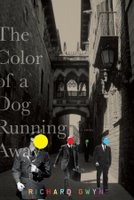 The Color of a Dog Running Away is the first novel by poet and translator Richard Gwyn. Published in Wales and Great Britain in 2005, it's taken its sweet time crossing the Atlantic. (His second novel, Deep Hanging Out, has just been released, but it'll be a while before we see that one either.)
The Color of a Dog Running Away is the first novel by poet and translator Richard Gwyn. Published in Wales and Great Britain in 2005, it's taken its sweet time crossing the Atlantic. (His second novel, Deep Hanging Out, has just been released, but it'll be a while before we see that one either.)Regarding the title: "In the language here this idiom refers to something of an indeterminate or vague and shadowy appearance, perhaps suggesting a fugitive reality" ("here" being Barcelona).
The book reads like a dream. That is, it has a dreamlike quality. It's a novel the way "Colourless green ideas sleep furiously" is a sentence. All the components are there, and they're awesome, yet they add up to something quite other (certainly not less, but I hesitate to say more — other, like a magic trick) than the sum of the parts.
The components are disparate, pulled out of a hat. Barcelona herself is prominently featured, with her unique history, architecture, and myths. Enter a femme fatale. An air of conspiracy. An expat community that inhales alcohol and drugs faster than Lucas's neighbour's rabbits breed.
Lucas receives a mysterious postcard. He talks through the immediate consequences of the postcard with a close friend:
"It's like a detective story," she said. "But in fact it contains only one element of mystery. The rest of it is simply boy meets girl. What you are trying to do is link the mysterious element with non-mysterious element in order to make your meeting with this girl appear utterly synchronistic, a meaningful coincidence. Or somehow preordained. Which of course it might be. But not necessarily in the way you think it is."
Of course, it's harder to maintain this cool-headed perspective as the mysterious elements pile up on top of each other.
Add a mythic group of roof-dwellers who never touch ground. (They're said to steal babies.) A megalomaniacal cult leader intent on reviving Catharism. A fire-eating prophet. A baron with a tower that served as a gaol during the Inquisition.
There's something about a cat. From a treatise on animal husbandry and the urban mystic, regarding the interesting case of cats:
It would seem that they provide something for their owners to stroke, to be comforted by, and to speak to. However, it is untrue that cats are diabolical. They simply unsettle people by the ease with which they snub affectionate advances, and inspire jealousy in the relaxed and libidinous lifestyles that they pursue amid the toiling masses of humanity.
Nuria, the femme fatale of the story, often has feline qualities attributed to her. When a "witch" gives her "a shell the size of a small cat," Nuria breaks it, and the story and all its characters seem to unhinge. There's something about the cat. It's saying something about Nuria, or about love. Something.
The novel drifts from one aspect to another fluidly, operating by its own internal dream logic. Farfetched, but somehow normalized. An awful lot happens, yet at the same time it feels like nothing at all. There are no tidy endings here, but it's written deftly, such that I feel the loose ends are left lying exactly where they ought to be. I rather like my endings ambiguous; they give bad novels the opportunity for me to forgive them and they keep good novels from ending at all. The Color of a Dog Running Away is sleeping furiously.
Richard Gwyn on Barcelona and how the city helped shape the book.
Excerpts:
The postcard.
The rooftops.


1 comment:
This is another book I've had my eye on recently. Glad you enjoyed it and it sounds really good. I'll have to see if my library carries it.
Post a Comment